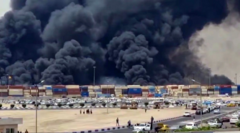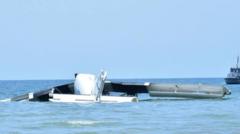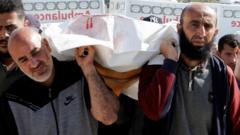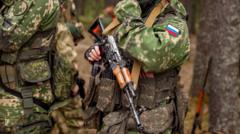The explosion at Shahid Rajaee port has led to national mourning and rising anger among Iranians, questioning the government's handling of hazardous materials. As the nation grapples with the aftermath, blame falls on authorities while investigations into the blast's cause unfold.
Iran's Port Explosion Sparks Mourning and Outrage Amid Grief and Speculation
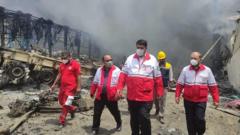
Iran's Port Explosion Sparks Mourning and Outrage Amid Grief and Speculation
A tragic blast at Iran's largest commercial port kills at least 40 and injures over a thousand, prompting expressions of sorrow and growing criticism of government oversight.
In Iran, emotions are shifting from mourning to anger following a devastating explosion at Shahid Rajaee port, the country's largest commercial hub, which killed at least 40 people and injured over 1,000. The incident occurred on Saturday morning, sending thick black smoke into the sky and forcing residents to rush to hospitals across the nation in a desperate bid to donate blood.
As emergency response efforts continued, health authorities advised residents in surrounding areas, including the southern city of Bandar Abbas, to remain indoors and adopt protective measures against toxic fumes. The government declared Sunday a day of national mourning, with Hormozgan province observing an additional two days of sorrow. Festivities in nearby locations transformed into solemn memorials for victims, as community leaders prayed for the injured.
However, as the dust begins to settle, a widespread blame game is brewing within Iran. Ambrey Intelligence, a maritime risk consultancy, suggested that the explosion might have originated from a fire caused by the mishandling of shipments containing solid fuel linked to ballistic missiles. Reportedly, iron pyrotechnic products, including sodium perchlorate, were involved, raising suspicions concerning military negligence.
Social media speculations have fueled public distrust of authorities, with many questioning why such hazardous materials were allowed to be stored unsafely at the port. As investigations continue, Iranian President Masoud Pezeshkian visited the site, emphasizing the need for accountability and swift resolution to any violations found. Defence ministry representatives denied allegations of military imports in the vicinity, insisting the fire stemmed from a depot storing chemical goods.
Economically, there are concerns regarding impending food shortages as the port plays a crucial role in facilitating nearly 80% of the nation's imports. While initially warning of severe disruptions, officials later claimed that operations would resume, albeit cautiously, as parts of the port might still function normally.
As firefighters battled raging flames and the authorities cordoned off access to the disaster area, international condolences poured in from various nations, including Russia, India, and the UAE, as the world closely monitors the implications of this disaster. Notably, this explosion coincided with critical nuclear discussions between Iranian and US delegations, where both sides reported some progress.
The full impact of this incident on Iran's political stability and international relations remains unclear as the country comes to terms with its grief while seeking answers amid rising public scrutiny.
As emergency response efforts continued, health authorities advised residents in surrounding areas, including the southern city of Bandar Abbas, to remain indoors and adopt protective measures against toxic fumes. The government declared Sunday a day of national mourning, with Hormozgan province observing an additional two days of sorrow. Festivities in nearby locations transformed into solemn memorials for victims, as community leaders prayed for the injured.
However, as the dust begins to settle, a widespread blame game is brewing within Iran. Ambrey Intelligence, a maritime risk consultancy, suggested that the explosion might have originated from a fire caused by the mishandling of shipments containing solid fuel linked to ballistic missiles. Reportedly, iron pyrotechnic products, including sodium perchlorate, were involved, raising suspicions concerning military negligence.
Social media speculations have fueled public distrust of authorities, with many questioning why such hazardous materials were allowed to be stored unsafely at the port. As investigations continue, Iranian President Masoud Pezeshkian visited the site, emphasizing the need for accountability and swift resolution to any violations found. Defence ministry representatives denied allegations of military imports in the vicinity, insisting the fire stemmed from a depot storing chemical goods.
Economically, there are concerns regarding impending food shortages as the port plays a crucial role in facilitating nearly 80% of the nation's imports. While initially warning of severe disruptions, officials later claimed that operations would resume, albeit cautiously, as parts of the port might still function normally.
As firefighters battled raging flames and the authorities cordoned off access to the disaster area, international condolences poured in from various nations, including Russia, India, and the UAE, as the world closely monitors the implications of this disaster. Notably, this explosion coincided with critical nuclear discussions between Iranian and US delegations, where both sides reported some progress.
The full impact of this incident on Iran's political stability and international relations remains unclear as the country comes to terms with its grief while seeking answers amid rising public scrutiny.





